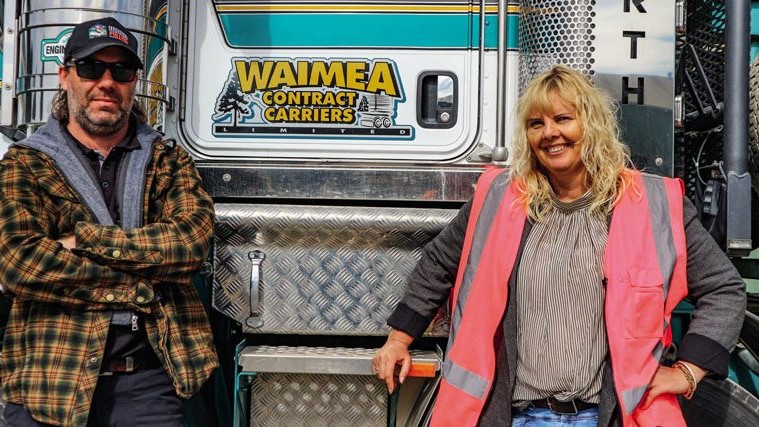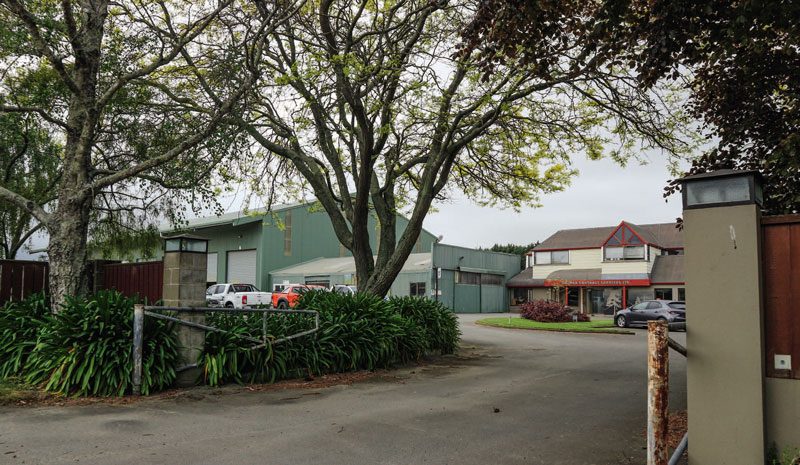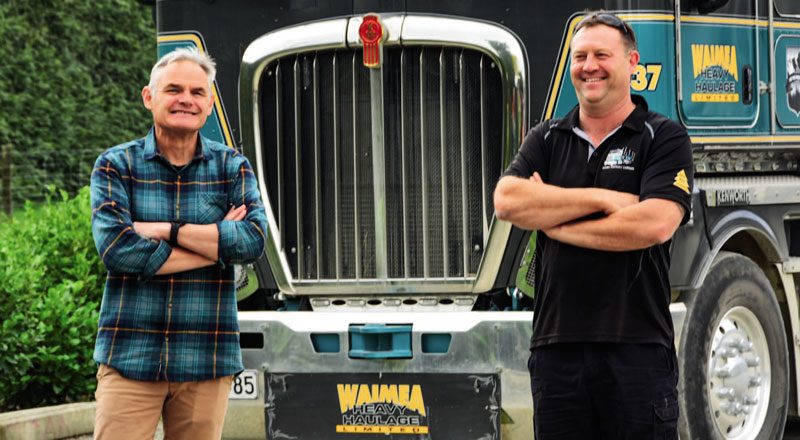A challenge or an opportunity – you decide

Born in Invercargill, Simon McIntyre grew up in Brightwater just to the southwest of Nelson. After qualifying as a mechanic in 1969, he drove log trucks for three years – his introduction to one of two industries that would form the cornerstones of his life’s work.
From there he worked in engineering support to the region’s hop and tobacco industries, a period daughter Jenny’s earliest recollections date back to.
“He bought an old Spot cigarette vendor van and set it up as a mobile workshop. I remember us looking for ‘ciggies’ that had fallen down in the sides and between the seats,” she says with a laugh.
Jenny also recalls the rural mail run he took on, all aimed at accruing enough money to buy a proper business. That came in the form of L A Brooks gravel screening business, an operation that worked out of the Waimea River. Processing aggregate would be his other great commercial interest.
“He just loved shaking gravel.”
Two KB Hinos were purchased as well as a Case & David Brown industrial tractor. One of the Hinos is still in the workshop today.
In 1982, a coal round was added and the first crusher purchased to service local New Zealand Electricity Department and Forest Service roading contracts.


Building a solid reputation, Waimea Contract Carriers (the later equipment building side was Wai Con) was involved in the sealing of the last part of the Shenandoah section of SH65, and was soon supplying all crushing for the Marlborough district. This included substantial yet difficult work in the vast roading network of the Marlborough Sounds.
Following a downturn in the coal industry in the mid-1980s, a Mercedes-Benz 2624, bought for coal cartage from the West Coast to Nelson, was redeployed to the cartage of peeler logs into IPL’s mill in Greymouth. It backloaded beech logs for chipping in Nelson. In time, the Benz was joined by a company S-Line that had been deployed on the road work in the Marlborough Sounds.
The first dedicated logger was a Volvo N12 with a TMC shorts setup. In the later part of the 1980s, the company won significant work with the Forest Service carting export logs to Nelson and peelers at night. Two ex-PanPac W-model Kenworths were secured to assist with this.
By the turn of the decade, the business comprised two crushers, the screening operation and their five log trucks, including the first brand-new truck, an F12 Volvo. The F12 was a significant unit in the company’s history for more than just that, though. Simon had taken on engineer Gary Hunt to work in the business and the Volvo had the first in-house log-gear and trailer build.
The demise of native logging on the West Coast in the early 1990s impacted commerce in the region significantly. The government provided support packages and, together with other businesses in the area, Waimea Contract Carriers formed a taskforce to seek opportunities and lodge applications for assistance. Enter the scene – CFO today, Phil Harris.
“I’d met Simon a couple of years earlier and he asked if I would assist in the taskforce’s work. It was an interesting project working with a group of unlikely allies. I got to know the McIntyres well. Our representation was successful and a couple of years later, Simon asked if I would come on board… and here I am still. It was a really sad time when Simon passed away but it’s been a fantastic journey, in what is a very difficult and challenging industry that doesn’t get any easier, I might add.”
The work the company picked up included the carriage of logs from the West Coast to Canterbury via Arthur’s Pass, as well as selected rimu veneer wood from the South Island’s remotest west and southwestern parts.
Back then, carting over Arthur’s Pass meant the infamous zig-zags. B-trains had to be split and taken over one half at a time. The Waimea ones also had to be four- axle rather than five in order to reduce cut-in on many of the touch-and-go corners they would encounter in the backblocks.
Simon had followed a B-train down the road and was horrified at the racking and torsional loads on the trailer. He instantly knew they could do better, and the result was a B-train that included 30 rubber torque rod bushes that ensured steel never touched steel, even isolating the fifth- wheel mount from the chassis. The result of his and Gary Hunt’s efforts was tracking and smoothness in a B-train set unseen prior to their commissioning.
The engineering arm (Wai Con) built trailing gear not just for Waimea, but outside customers as well. Simon’s philosophy was you build the learnings from operating gear in your own region into each new build. They were even building their own brand of crushing plants. However, as the company grew and expanded the external work reduced.
In 2007, Waimea purchased TNL logging with eight trucks and staff joining the ranks and in 2009, it built a new engineering and maintenance facility on-site at its Edens Road home.
Simon’s wife Marlene had been active in the business, and children Jenny and Peter were around the business their whole life. “Sweeping floors, whatever… we were always around it,” says Jenny. “I worked there off and on, both part and full time growing up, using the money to support my passion of eventing horses, as well as a spell studying.” Around the turn of the century, Jenny came back in full time.

A qualified engineer in his own right, Peter was in boots and all also.
In an article written by Bryce Biard in the November 1994 issue of New Zealand Trucking magazine, Simon McIntyre attributed the success of his business to the people he had around him. Jenny remembers her dad as a great delegator of responsibility, with integrity in his relationships and dealings with all people.
At the end of the century’s first decade a series of events began that would test whether those characteristics were passed on in their entirety. Simon became ill in 2010 and died in May 2011.
“So much IP was in Dad’s head, we had to piece what we didn’t know together as best we could,” said Jenny. “He was a creative innovator, typical of the era, never say ‘no’, then figure out ‘the how’ when you hang up the phone.
“Initially the plan was to maintain our way of doing business. It had worked for Dad and so must be a solid model. We also brought Phil [Harris] onto the general manager position, Dad’s righthand man.”
But things were changing rapidly. Ever-increasing compliance drove costs into the business. The company had also taken on both a health and safety officer and driver trainer prior to Simon’s passing, essential in any business of its size in the markets it targeted.
“At the time Dad died, we did 60% Nelson Forests’ (now One Forty One) work, and 100% of Hancocks’ (now Nelson Pine Forest Ltd). We’d also made an acquisition in Marlborough and the equipment wasn’t where it should have been and so we’d poured money into that. In addition, weather and forest fires were hampering operations.
“In the end, we realised we were in a bit of strife. So, in 2015, sought professional advice, called for help, resulting in voluntary administration. We were worried for the business and the people who depended on us.
“It was the best thing we could have done. From the moment they arrived, the administrators could see the firm had great integrity, great bones, no shortage of work. We just needed to recoup a level of revenue that reflected the effort we made, and the service we gave. It was recommended an independent director be appointed – a role taken up by Neil Reid.
“We focused on vehicle utilisation and safety, and we all rolled up our sleeves.
“The exercise itself cost us a lot of money but the learnings, tools, relationships, processes, and systems we’ve gained actually make it an incredibly worthwhile ‘investment’ in hindsight. Yes it was stressful, really stressful, but also incredibly educational. We’re so much the better for it now.”
In November 2018, Stuff ran an article, celebrating the Waimea team’s achievements with all creditors paid in full, and the administrators lauding what can be achieved when the flags are raised early and the team willing. It says a lot about a company and its people when they not only identify an issue that might be beyond them, but are humble enough to call for help.
Simon McIntyre’s belief in the human asset proved itself in the most testing of times – in the boardroom, the workshop and behind the wheel.
“We have a way we want to run the business, and it’s not necessarily a cheap way. It’s not with shortcuts – that’s not our ethos. It is doing things right and that needs to be supported, and in a way rewarded. That wasn’t happening.”
Today, a memory it might be, but the takeaways will live on forever.
“We sold the crushing and screening business,” says Jenny. “It was taking 80% of the effort for 20% of the revenue. We now also lease the engineering workshop to Waimea Engineering, who build trailer product to our specification with Peter, rather than do the whole thing ourselves.

“Today there are 57 trucks in the fleet and 75 staff. We focus on corporate log work, and heavy haulage to both the forestry and civil sectors. The latter was Peter’s brainchild in 2015, and has proven to be a fantastic business with four transporters in the division working each and every day. It’s also a great place to blood new recruits in the lower licence classes into the log business via the piloting function, where they learn radio calls, forest etiquette, and our companion culture etc.”
What the past decade hasn’t done, however, is impact the company’s relentless desire to challenge the accepted and ‘annoy’ a problem with collaborative partners until they have it cracked. There was always a chance that the inherent desire to innovate, experiment, diversify and look beyond, may have been dinted in the fallout as the inclination to protect the balance sheet became paramount. But over- conservatism is not in the DNA of this region and certainly not this family, and at the end of the day, innovation is the key to success in 2022.
Risk is the mother of reward, after all, hence the fantastic work being undertaken in the areas of load height, stability, and restraint. Then there’s the innovative way the company views that innovation in the context of safety outcomes.
Waimea Contract Carriers is a fascinating place to spend a couple of days as a visitor. The way Jenny and Peter both move through the company and speak to the crew resembles that of a founder rather than generation two. Walk through a company with a founder and they often speak differently, especially to the people who were with them when there was no money. When they said ‘yes’, but had no idea how. When they all hoped loyal old trucks would keep going so they could fight to live another day, and a great Friday night was two fish each and $40 chips eaten from newspaper on the workshop floor with a couple of quarts each, and the wireless going. Normally, it’s the old chestnut of your kids don’t lead your life.
But that doesn’t play out here. Observing the generation two McIntyres wander through, you’d think it was a brother sister start-up. There’s a chat with everyone. They know everyone. They listen. There’s an ease, an appreciation that’s only there when all parties interacting have a commonality to their journeys. Something they will always share that whoever comes next will hopefully never have to. Having looked into the abyss and come away, they actually know what it must have been like to support a family with only a bunch of tools and an old cigarette vendor’s van.
“Peter and I can’t thank enough the people who have stuck with us throughout. Both staff and customers. It is only about the people at the end of the day. That’s all it’s about.”
Read more
I can do that too
0 Comments6 Minutes
April 2025
0 Comments1 Minute





